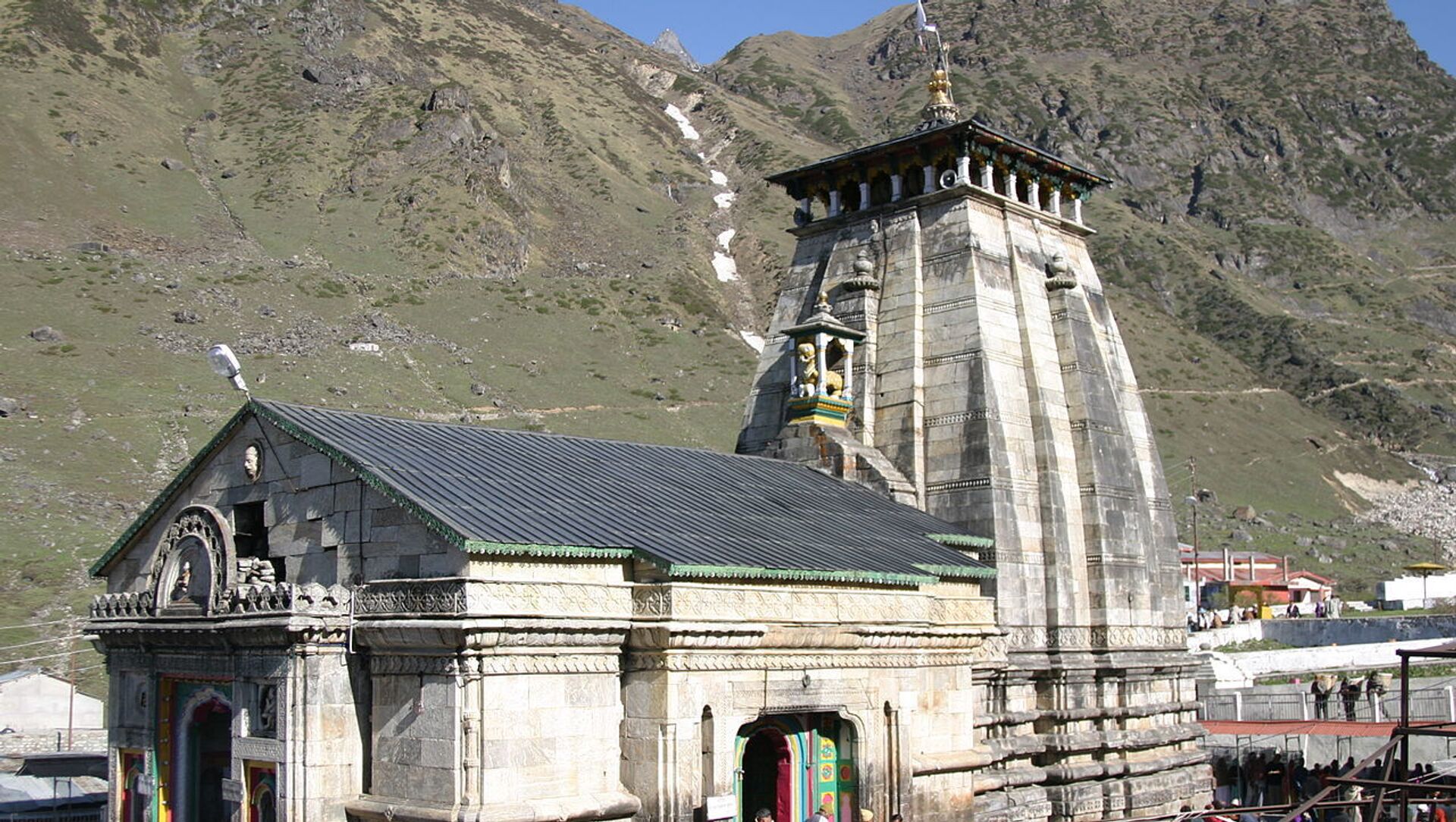https://sputnikglobe.com/20210812/india-priests-accuse-bjp-govt-of-targeting-their-community-through-shrine-board-in-uttarakhand-1083579252.html
India: Priests Accuse BJP Gov’t of Targeting Their Community Through Shrine Board in Uttarakhand
India: Priests Accuse BJP Gov’t of Targeting Their Community Through Shrine Board in Uttarakhand
Sputnik International
Uttarakhand Char Dham Devasthanam Board was established by the state government in January 2020. The four famous Hindu shrines – Badrinath, Kedarnath, Gangotri... 12.08.2021, Sputnik International
2021-08-12T06:24+0000
2021-08-12T06:24+0000
2022-10-19T20:02+0000
newsfeed
world
indians
indians
uttarakhand
temple
temple
sputnik
sputnik
sputnik-1 satellite
https://cdn1.img.sputnikglobe.com/img/107913/22/1079132240_0:16:1280:739_1920x0_80_0_0_3d13b16d4a23dc44f3d5fad4a8ccfd6d.jpg
The Chardham Teerthpurohit Haq Hakukdhari Mahapanchayat Samiti, an organisation of priests in the Himalayan state of Uttarakhand, has threatened a statewide agitation starting from 16 August against the state government led by the Bharatiya Janata Party (BJP) to press their demand that a state board of shrines, the Uttarakhand Char Dham Devasthanam Board, be dissolved.The community has also said that if their demand is not met, they will organise sit-in protests outside the residence of the newly-appointed state chief, Pushkar Singh Dhami, in Dehradun.He stated that while implementing "the master plan" in Badrinath and Kedarnath, the shrine board is demolishing homes and shops on their own.“Before implementing any master plan, the government consults the people of the area, but the board is not even considering it,” he added.Accusing the state government of acting in a non-democratic way, Kothiyal said that though BJP claims to be a Hindu party, the state government doesn’t even listen to the religious community's concerns.Responding to the question about dialogue with the government, he said that new chief minister Pushkar Singh Dhami is also dilly-dallying by saying a high-powered committee will look into the situation arising after the formation of the board and related legal aspects.Accusing the government of taking over the temples in the name of development, Kedar Sabha president Vinod Shukla told Sputnik that it should refrain from intervening in religious matters.“If the government wants to take up the development projects, they could have done so under the Shri Badrinath-Shri Kedarnath Act of 1939,” he stated.In January 2020, the then Uttarakhand state chief, Trivendra Singh Rawat, established the Uttarakhand Char Dham Devasthanam Board under the Uttarakhand Char Dham Devasthanam Management Act of 2019.The shrine board is the highest governing body for the management of the temples with powers to frame policies, make decisions to give effect to the provisions of this Act, and to sanction expenditures, among others.The four shrines under the board are famous pilgrimage centres of India and are revered by millions of Hindus.Previous Arrangement for Management of the ShrinesBefore the establishment of the board, two of the shrines, Badrinath and Kedarnath, along with 49 other temples around them were managed by Shri Badrinath-Shri Kedarnath Mandir Samiti, a government body established under the Shri Badrinath-Shri Kedarnath Act of 1939.The decisions related to the use of donations, funds and development works in and around the shrines and other temples were taken by that committee and the government did not intervene. But through the Devasthanam board, the government has taken control of financial and policy-related decisions.In Gangotri and Yamunotri, the other two pilgrimage centres, the management was in the control of local trusts and the government didn't get anything from the donations made by devotees.
uttarakhand
Sputnik International
feedback@sputniknews.com
+74956456601
MIA „Rosiya Segodnya“
2021
Rahul Trivedi
https://cdn1.img.sputnikglobe.com/img/07e5/05/12/1082926121_0:-1:627:627_100x100_80_0_0_d882e1a63f627c25b7a534fb8b8234d7.jpg
Rahul Trivedi
https://cdn1.img.sputnikglobe.com/img/07e5/05/12/1082926121_0:-1:627:627_100x100_80_0_0_d882e1a63f627c25b7a534fb8b8234d7.jpg
News
en_EN
Sputnik International
feedback@sputniknews.com
+74956456601
MIA „Rosiya Segodnya“
Sputnik International
feedback@sputniknews.com
+74956456601
MIA „Rosiya Segodnya“
Rahul Trivedi
https://cdn1.img.sputnikglobe.com/img/07e5/05/12/1082926121_0:-1:627:627_100x100_80_0_0_d882e1a63f627c25b7a534fb8b8234d7.jpg
newsfeed, indians, indians, uttarakhand, temple, temple, sputnik, sputnik, sputnik-1 satellite
newsfeed, indians, indians, uttarakhand, temple, temple, sputnik, sputnik, sputnik-1 satellite
India: Priests Accuse BJP Gov’t of Targeting Their Community Through Shrine Board in Uttarakhand
06:24 GMT 12.08.2021 (Updated: 20:02 GMT 19.10.2022) Uttarakhand Char Dham Devasthanam Board was established by the state government in January 2020. The four famous Hindu shrines – Badrinath, Kedarnath, Gangotri and Yamunotri – and 49 other temples come under the purview of the shrine board. The priests of the four shrines have been continuously protesting against the board.
The Chardham Teerthpurohit Haq Hakukdhari Mahapanchayat Samiti, an organisation of priests in the Himalayan state of Uttarakhand, has threatened a statewide agitation starting from 16 August against the state government led by the Bharatiya Janata Party (BJP) to press their demand that a state board of shrines, the Uttarakhand Char Dham Devasthanam Board, be dissolved.
The community has also said that if their demand is not met, they will organise sit-in protests outside the residence of the newly-appointed state chief,
Pushkar Singh Dhami, in Dehradun.
“The state government wants to place government officials in religious places through this board. The priests and other stakeholders are being brought under the board,, which is unfair. The board does everything without consultation of the stakeholders,” Krishna Kant Kothiyal, president of Chardham Teerthpurohit Haq Hakukdhari Mahapanchayat Samiti, a flag-bearing organisation against the constitution of the board, told Sputnik.
He stated that while implementing "the master plan" in Badrinath and Kedarnath, the shrine board is demolishing homes and shops on their own.
“Before implementing any master plan, the government consults the people of the area, but the board is not even considering it,” he added.
Accusing the state government of acting in a non-democratic way, Kothiyal said that though BJP claims to be a Hindu party, the state government doesn’t even listen to the religious community's concerns.
Responding to the question about dialogue with the government, he said that new chief minister Pushkar Singh Dhami is also dilly-dallying by saying a high-powered committee will look into the situation arising after the formation of the board and related legal aspects.
“The state government is misleading us and is not serious about the concerns of the priest community,” the priest organisation's chief said.
Accusing the government of taking over the temples in the name of development, Kedar Sabha president Vinod Shukla told Sputnik that it should refrain from intervening in religious matters.
“If the government wants to take up the development projects, they could have done so under the Shri Badrinath-Shri Kedarnath Act of 1939,” he stated.
In January 2020, the then Uttarakhand state chief, Trivendra Singh Rawat, established the Uttarakhand Char Dham Devasthanam Board under the Uttarakhand Char Dham Devasthanam Management Act of 2019.
The shrine board is the highest governing body for the management of the temples with powers to frame policies, make decisions to give effect to the provisions of this Act, and to sanction expenditures, among others.
The four shrines under the board are famous pilgrimage centres of India and are revered by millions of Hindus.
Previous Arrangement for Management of the Shrines
Before the establishment of the board, two of the shrines, Badrinath and Kedarnath, along with 49 other temples around them were managed by Shri Badrinath-Shri Kedarnath Mandir Samiti, a government body established under the Shri Badrinath-Shri Kedarnath Act of 1939.
The decisions related to the use of donations, funds and development works in and around the shrines and other temples were taken by that committee and the government did not intervene. But through the Devasthanam board, the government has taken control of financial and policy-related decisions.
In Gangotri and Yamunotri, the other two pilgrimage centres, the management was in the control of local trusts and the government didn't get anything from the donations made by devotees.





